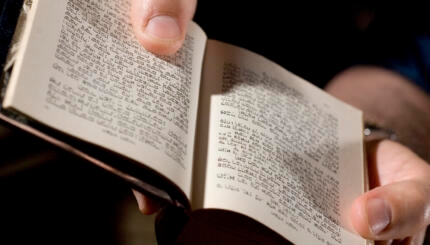A few years ago, I was invited to become part of an interfaith clergy group in Brooklyn. The group had historically comprised mainly Christians of various denominations, and it was trying to get rabbis and imams involved. The group remained mostly Christian, with one imam and me, and maybe one other Jewish clergy member. The first time I attended, I was the only non-Christian present.
At the opening of the meeting, the presiding minister turned to me and said, “Rabbi, would you give the opening prayer?” Of course I said yes, but my mind was racing — my rabbinic training and my Jewish education did not prepare me to offer spontaneous, public prayer. The Jews are the people of the book, and in the case of prayer, that means the prayerbook, where our prayers are fixed and written down! I managed something, and at subsequent meetings I was prepared with a brief insight from the week’s Torah portion followed by a blessing for our group, just in case. The leaders of the group frequently asked me to offer a prayer, as a way of showing respect for the rabbi in the room, unaware, I think, that spontaneous public prayer is not part of most Jewish practice.
It is not that there is no room for spontaneous prayer in Judaism. There is a silent prayer at the conclusion of the amidah, which is a time for prayer in the worshiper’s own words (though there are words for it in the prayerbook if you want to use them). I pray with people when I visit them in the hospital, and those are extemporaneous prayers. I know many people who speak to God regularly from their hearts, without a prayerbook.
READ: Fixed Prayer vs. Spontaneity
But this is not something that has come easily to me, either privately or in public. I am more comfortable using the words of the prayerbook.
Last week my family and I were privileged to see Fiddler on the Roof on Broadway. We enjoyed it a great deal. I had seen the movie, but I had never seen it live. One element of Danny Burstein’s performance as Tevye has stayed with me. Throughout the show, Tevye speaks to God. He is sometimes plaintive, pleading, or angry, but there is always an intimacy to it, a palpable sense that Tevye is in close relationship with God, that God is always with him even if God is not being helpful. It was so moving.
READ: The Making of the Film Version of “Fiddler on the Roof”
There are different ways that I feel connected to God and to Judaism. I love studying Torah, and whenever I have a new insight, see an idea in the text that I’ve never seen before, for me that’s revelation, a moment of connection to God. I’ve felt God’s presence in a hospital emergency room, looking into the eyes of a sick woman who was far from her home and alone. But my spiritual journey is not complete, and I aspire to achieve that sense of intimacy with God that Tevye has. I have begun practicing hitbodedut, a form of Jewish meditation rather like Tevye’s communications to God — you just talk to God, saying anything on your mind, even if it’s inane. As with all meditation, and as with prayer in general, it is a practice that may not feel immediately meaningful. It is one of the ways I am reaching toward God.
READ: In Judaism, Who (or What) Is God?
In Judaism, there is no one prescribed way to think about God, and we are each responsible for developing our own relationship with God, in whatever way we understand that word “God.” This is something I have found freeing about Judaism, and also challenging. May we each find the relationship with God that is the right one for us.
(Photo by Avishai Teicher)



